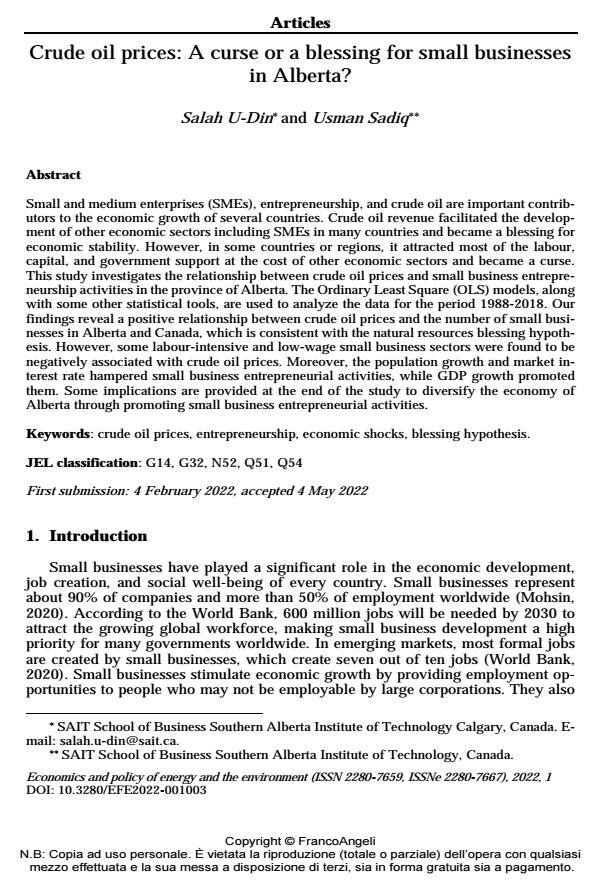Crude oil prices: A curse or a blessing for small businesses in Alberta?
Titolo Rivista ECONOMICS AND POLICY OF ENERGY AND THE ENVIRONMENT
Autori/Curatori Salah U-Din, Usman Sadiq
Anno di pubblicazione 2022 Fascicolo 2022/1
Lingua Inglese Numero pagine 18 P. 33-50 Dimensione file 164 KB
DOI 10.3280/EFE2022-001003
Il DOI è il codice a barre della proprietà intellettuale: per saperne di più
clicca qui
Qui sotto puoi vedere in anteprima la prima pagina di questo articolo.
Se questo articolo ti interessa, lo puoi acquistare (e scaricare in formato pdf) seguendo le facili indicazioni per acquistare il download credit. Acquista Download Credits per scaricare questo Articolo in formato PDF

FrancoAngeli è membro della Publishers International Linking Association, Inc (PILA), associazione indipendente e non profit per facilitare (attraverso i servizi tecnologici implementati da CrossRef.org) l’accesso degli studiosi ai contenuti digitali nelle pubblicazioni professionali e scientifiche.
Small and medium enterprises (SMEs), entrepreneurship, and crude oil are important contrib- utors to the economic growth of several countries. Crude oil revenue facilitated the develop- ment of other economic sectors including SMEs in many countries and became a blessing for economic stability. However, in some countries or regions, it attracted most of the labour, capital, and government support at the cost of other economic sectors and became a curse. This study investigates the relationship between crude oil prices and small business entrepre- neurship activities in the province of Alberta. The Ordinary Least Square (OLS) models, along with some other statistical tools, are used to analyze the data for the period 1988-2018. Our findings reveal a positive relationship between crude oil prices and the number of small busi- nesses in Alberta and Canada, which is consistent with the natural resources blessing hypoth- esis. However, some labour-intensive and low-wage small business sectors were found to be negatively associated with crude oil prices. Moreover, the population growth and market in- terest rate hampered small business entrepreneurial activities, while GDP growth promoted them. Some implications are provided at the end of the study to diversify the economy of Alberta through promoting small business entrepreneurial activities.
Parole chiave:crude oil prices, entrepreneurship, economic shocks, blessing hypothesis.
Jel codes:G14, G32, N52, Q51, Q54
Salah U-Din, Usman Sadiq, Crude oil prices: A curse or a blessing for small businesses in Alberta? in "ECONOMICS AND POLICY OF ENERGY AND THE ENVIRONMENT" 1/2022, pp 33-50, DOI: 10.3280/EFE2022-001003